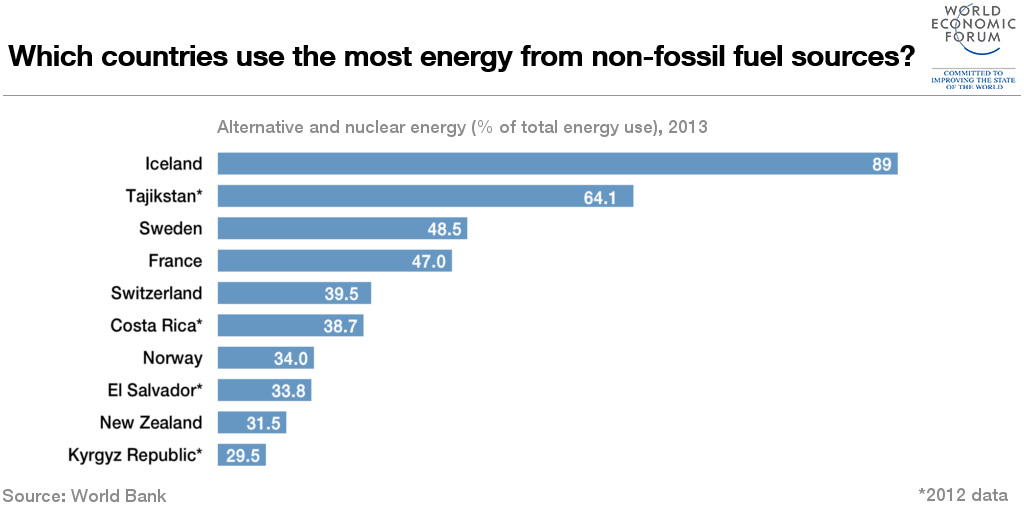Which countries are least dependent on fossil fuels?

Stay up to date:
Energy Transition
In the run-up to COP21, the climate conference being held in Paris in December, there’s an increasing focus on countries that are the least dependent on fossil fuels.
Using the most up-to-date World Bank Indicator figures from 2013 and 2012, the chart below shows the countries using the most energy from non-carbon sources – i.e. hydropower, nuclear, geothermal, wind and solar.
Most of these countries make heavy use of hydroelectric power. Tajikistan and the Kyrgyz Republic in Central Asia benefit primarily from large hydroelectric plants, and are both planning to grow their capacities in coming decades.
Sweden, Switzerland, Norway and New Zealand also benefit from abundant hydroelectric resources; as does Costa Rica, which at the beginning of 2015 announced that it had powered the country for 75 days using only renewable-energy resources, primarily generated by hydropower plants that had benefited from unusually heavy rainfall.
Iceland, at the top of the list, makes more use of its extensive natural geothermal resources to power its small but highly green economy, producing 65% from geothermal sources alongside 20% from hydropower. El Salvador is the largest producer of geothermal energy in Central America, and also makes use of hydroelectric power.
France is the only country in which hydroelectric plays a small part in its energy production, at around 10%. Instead it derives 75% of its energy from nuclear power, though this share is set to fall to 50% by 2025.
Have you read?
How green is your city?
Are renewables cheaper than fossil fuels?
Which countries produce the most energy from coal?
To keep up with Agenda, subscribe to our weekly newsletter.
Author: Sebastian Brixey-Williams is a Digital Content Producer at Formative Content.
Image: A technician works an electrical line, April 29, 2014. REUTERS/Carlo Allegri
Don't miss any update on this topic
Create a free account and access your personalized content collection with our latest publications and analyses.
License and Republishing
World Economic Forum articles may be republished in accordance with the Creative Commons Attribution-NonCommercial-NoDerivatives 4.0 International Public License, and in accordance with our Terms of Use.
The views expressed in this article are those of the author alone and not the World Economic Forum.
Related topics:
Forum Stories newsletter
Bringing you weekly curated insights and analysis on the global issues that matter.
More on Climate ActionSee all
Tom Crowfoot
May 27, 2025
Daniella Diaz Cely
May 27, 2025
Pascale Junker
May 26, 2025
Silvio Dulinsky
May 23, 2025
Ryan McClanaghan and Lisa Chamberlain
May 23, 2025



